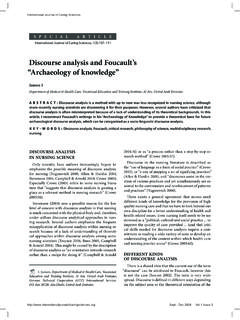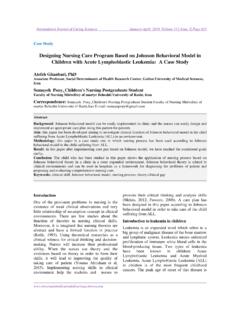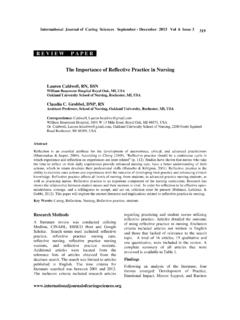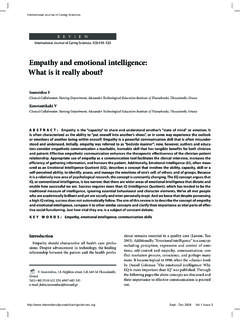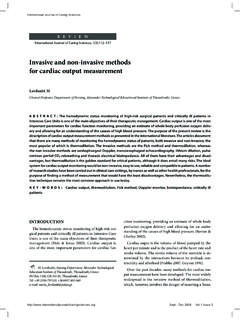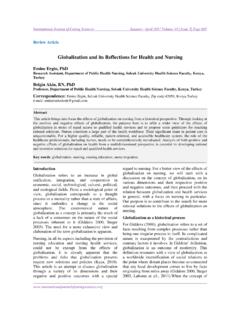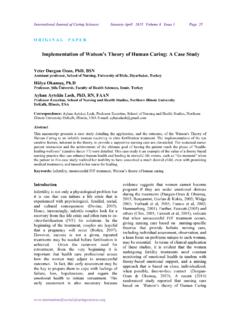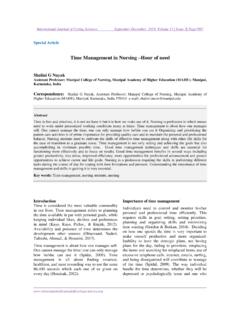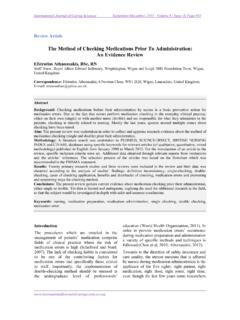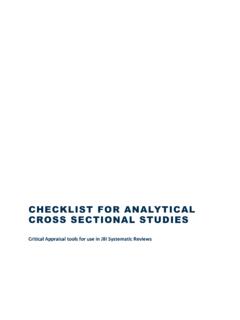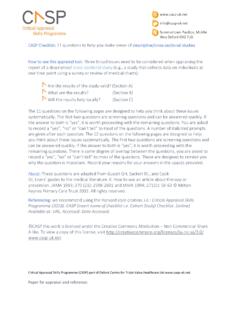Transcription of Impact of Procrastination and Time-Management on …
1 International Journal of Caring Sciences September-December 2019 Volume 12 | Issue 3| Page 1480 Original Article Impact of Procrastination and Time-Management on Academic Stress among Undergraduate Nursing Students: A cross sectional study Shalini G Nayak, PhD Assistant Professor, Manipal College of Nursing Manipal, Manipal Academy of Higher Education (MAHE) Manipal, Karnataka, India Correspondence: Shalini G Nayak, PhD, Assistant Professor, Manipal College of Nursing Manipal, Manipal Academy of Higher Education (MAHE) Manipal, Karnataka, India e-mail: Abstract Nursing profession demands the skills for working in busy schedules, stressful situations and unexpected emergencies in the hospitals. There is need to inculcate good time management skills and reduction in Procrastination to prepare the students to work in the hospitals.
2 This cross - sectional study focused on assessing the Procrastination , time management skills and its relationship with academic stress among 201 undergraduate nursing students in a private college of South India. Finding showed that mean (+ SD) of Procrastination was (+ ) which is above the mean (81) score of the tool indicating lesser Procrastination by the undergraduate nursing students. There was positive correlation between Procrastination and academic stress with r=.185 (p=.009); time wasting and academic stress r=.253 (p= ) among the undergraduate nursing students which is statistically significant at level of significance. study implies that helping the undergraduate students for effective time management for reducing the academic stress and better academic performance is essential.
3 Key words: Academic Stress, Nursing Students, Procrastination , India, Time Management Introduction Procrastination is a prevailing phenomenon in the academic settings with a range of negative consequences (Goroshit, 2018) (Zacks & Hen, 2018). Procrastination in academics is a prevalent behavior among students that negatively influences the well-being and performance (Hen , 2018). One of the common barriers to productivity is Procrastination . People often put off the things very last moment even after knowing that it will put them in turmoil. Delaying the things for the last minute also results in anxiety and distressed state of mind (Homisak, 2012). Procrastination in academics is well studied phenomenon and it is indicated that over 70% of students report delay in learning and tasks on regular basis in the higher education and college setting (Steel & Klingsieck, 2016).
4 Time is not a kind of resource which one can increase by working hard (Tanr gen & I can, 2009). Time management is all about how we manage self (Spidal, 2009). It is about finding healthiest, smartest and most rewarding way to use the same 86,400 seconds which each one of us given on every day (Homisak, 2012). Increasing the quality of activities performed in limited period of time is the main aim of time management (Tanr gen & I can, 2009). Prioritizing the tasks is very essential for managing the time effectively (Ashurst, 2014). Deciding on how we spend the time is very essential to make ourselves productive and more organized (Spidal, 2009). This requires skills in goal setting, setting priorities, planning and organizing skills and minimizing time wasting (Gordon & Borkan, 2014).
5 The life process in the university is the preparation stage for taking responsibility and working. Acquiring time International Journal of Caring Sciences September-December 2019 Volume 12 | Issue 3| Page 1481 management related skills during this process is an important role for a student (Tanr gen & I can, 2009). Success of a University student depends on their ability and efficiency of utilizing time (Kaya, Kaya, Pallos , & K k, 2012), (Tanr gen & I can, 2009). Nursing is skill oriented programme and students need to gain the knowledge required for the profession to practice in the future (Mirzaei, Oskouie, & Rafii, 2012). Time management is an important and crucial to acquire competence and skill for the nursing students (Kaya, Kaya, Pallos , & K k, 2012).
6 Health care workers working in a busy health settings should be having an essential skill of good time management (Ancel & Yilmaz, 2016). Nursing is a profession requiring the skills multitasking during the course of day for coping with time limitations and pressure (Ancel & Yilmaz, 2016). Nurses are indispensable part of the health care system (Blevins & Millen, 2016) and the continual and growing shortage of nurses demands working smarter than harder for improving quality care (Said, 2014). Nurses need to meet the expectations of patients, peers, managers, along with completing the nursing activities in a given shift (Cleary & Horsfall, 2011) and inadequate time management has shown delay in patient care and patient safety (Blevins & Millen, 2016).
7 Contingencies also arise in the schedule which need to be identified as high, medium and low priority and should be best fit in the shift by the nurses (Cleary & Horsfall, 2011). Whenever, time limitations are more nurses may not be able to think critically, prioritize and tend to make more errors (Blevins & Millen, 2016). Leaping out of the safe boundaries of the classroom to the busy, noisy, and sometimes life or death environment of the clinical setting or hospital can completely frazzle the students (Bullen, 2015). Professional nursing practice and work performance, nurses should have good time management skills and different time management strategies (Said, 2014). Realizing the need of time management is very essential, to prevent burnout in managing personal life and duty shifts (Bullen, 2015).
8 Thus, time management is an exceptionally important skill for nursing students for their academic life and career since they must be prepared for unanticipated emergencies and urgencies at work stress is a universal phenomenon and affects the grades of the students in all the levels (Deb, Strodl, & Sun, 2015) Students obtaining training for helping professional disciplines including nursing may be at increased risk of stress levels (Enns, Eldridge, Montgomery, & Gonalez, 2018) and nursing students also face immense stressors during the student life that affecting the physical and mental health leading to poor academic performance (Rathnayake & Ekanayaka, 2016). The key causes of academic stress is long classes, regular examinations, over expectations from parents and teachers, different teaching methods and comparisons among the students (Deb, Strodl, & Sun, 2015).
9 There are few studies conducted in the past among the nursing students to assess the academic Procrastination (Custer, 2018), time management (Kaya, Kaya, Pallos , & K k, 2012) and academic stress (Brown, Anderson-Johnson, & McPherson, 2016), ( Yucha, Kowalski, & cross , 2009), (Gurkov & Zelen kov , 2018) in comparison with different outcome variables. But evidence of relating Procrastination , time management and academic stress in this population is limited. The present research, perhaps is an initial effort to study the relationship between Procrastination , time management skills and academic stress among nursing students. Methods Design, Participants and ethical considerations: A descriptive correlational survey design was used to answer the research question.
10 The study was conducted in a largest private college of nursing in Udupi District, Karnataka; which offers various undergraduate, post graduate, MPhil Nursing, PhD in nursing and specialized courses in nursing studies. The annual enrolment for basic undergraduate nursing programme is 100 with the students representing from all over India. Undergraduate Nursing students were enrolled for the study by using proportionate stratified sampling (50% from each batch). Students from each academic year were selected by systematic random sampling using registration number list of the students (first year = 51, second-year = 50, third-year = 53, fourth year = 47). study as approved by Institutional Ethics Committee (IEC 443/2017) and the study was conducted according to the ethical principles of IEC.
